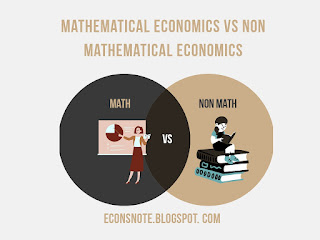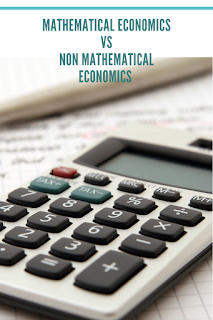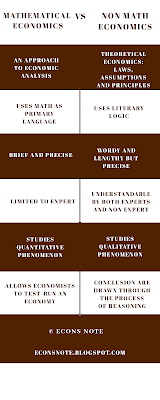Economics is a science that studies human behavior. It is mainly concerned with studying the whole economy using different models to describe real life economic experiences and situations. This of course has been the basis of every economic theory today.
However, this has eventually led economists to believe that there are two ways of dealing with economic problems which are the mathematical approach and the non mathematical approach.
Though over the years, many economists no more believe in economics without math or with little math and thereby derided the non mathematical approach to economics as a literary approach.
Anyway this post is not raise an argument about which approach is better but to highlight the differences between the mathematical and non mathematical economics otherwise known as literal economics.
What Is Mathematical Economics?
Mathematical economics is neither a distinct branch nor a subfield in Economics. Rather, it is an approach to economic analysis.
What Is Mathematical Economics?
Mathematical economics is neither a distinct branch nor a subfield in Economics. Rather, it is an approach to economic analysis.
Hence, it can be defined as the use of Mathematics and mathematical methods in:
• writing and testing economic assumption,
• creating economic theories,
• investigating and solving economic problems,
• and predicting economic behavior.
In other words, it can be defined as the use of mathematical symbols, signs, principles and techniques in economic studies.
Types of mathematics used in economics include:
Algebra – usually used for computation and building of economic models
Calculus – for measuring the rate of change in an economy especially economic growth.
Statistics – for measuring economic data and variables.
What Is Non Mathematical Economics?
Non mathematical economics just as you might have thought, is a review of all economic theories, principles, thoughts or assumptions used in simplifying complex economic events.
It is often referred to as the literary logic i.e. the words, sentence, assumptions and the postulates drawn in the process of reasoning.
The non mathematical economic approaches are usually viewed as unscientific and unreliable, though they are sound approaches, but its assumptions and theories in literal from cannot be proved without the quantitative reasoning. Hence, the need for mathematics.
And ever since the introduction of mathematics in economics, the use of mathematics has become so important and widely used that nearly all topics in economics involves mathematical reasoning.
Therefore, we can say Mathematical economics is the backbone of economics I.e for the interpretation and testing of literary economics.
And from here, you should be able to deduce one or two differences between the mathematical economics and the non mathematical economics.
Mathematical Economics Vs Non Mathematical (Literary) Economics
1: Mathematical economics is just an approach in economics while non mathematical economics are the theories, laws, assumptions and principal believes in economics.
2: Mathematical economics involve the use of mathematical symbols and equations while in literary economics, words and sentences are used.
Mathematical Economics Vs Non Mathematical (Literary) Economics
1: Mathematical economics is just an approach in economics while non mathematical economics are the theories, laws, assumptions and principal believes in economics.
2: Mathematical economics involve the use of mathematical symbols and equations while in literary economics, words and sentences are used.
In order words, mathematical economics uses Mathematics while non mathematical economics uses Literary logic.
For instance in literary economics, profit is said to be realized when the total revenue of a firm is greater than its total cost. – literal definition.
Meanwhile, this same concept can be defined mathematically as; the profit of a firm is the difference between it's total revenue and the total cost. And it can be mathematically express as:
Profit (π) = TR - TC. Where TR = Total Revenue and TC = Total Cost.
Profit (π) = TR - TC. Where TR = Total Revenue and TC = Total Cost.
Here, the two definitions are the same only that we made use of mathematics as the mode of language in the second definition.
3: Mathematical economics exemplify brevity and preciseness while on the other hand, literary economics is always comprehensive, detailed and precise.
3: Mathematical economics exemplify brevity and preciseness while on the other hand, literary economics is always comprehensive, detailed and precise.
A good example is you writing: Qd = Qs. where Qd= Quantity demanded and Qs= Quantity supplied or, you writing
market equilibrium of price and quantity is achieved when quantity demanded in the market equals the quantity supplied to the market.
You can see that just writing "Qd = Qs" is more brief and precise than the whole sentence above. Though, simply writing that equation may not be fully understood by someone who's not in economics field, because there is little to draw upon and that will lead us to the next difference.
4. The understanding of mathematical economics is usually limited to expert i.e it is comprehensible only by those having some mathematical knowledge.
But non mathematical economic is understandable by both experts and non-expert since it always in literary form – simple/general language.
5. Mathematical economics only studies the quantitative phenomena and does not understand human behavior like rationality – qualitative economics.
5. Mathematical economics only studies the quantitative phenomena and does not understand human behavior like rationality – qualitative economics.
While on the other hand, non-mathematical economics deals with the qualitative phenomena and little of the quantitative phenomena in economics.
NB: Quantitative phenomenon usually involve combining and comparing economic data or figures, examining the rates of changes in them and so on. While qualitative phenomenon represents the information about the nature of economics.
6. Mathematical economics allow economists to test run an economy simply by using some economic models and measuring how effective it is.
6. Mathematical economics allow economists to test run an economy simply by using some economic models and measuring how effective it is.
This is of course is not totally possible in literary economics since conclusion are made through the process of reasoning.
Though in this case and in every other cases, assumptions and theories in non mathematical economics serves as guides in mathematical economics.
7. Mathematical economics employs mathematical techniques like algebra and calculus as tools in deriving a set of conclusion or theorem while non mathematical economics employs the process of deductive reasoning in making assumptions and deriving theorems.
Final Note:
Having highlighted the differences between mathematical economics and non mathematical economics, it's very important to also let you know that mathematical economics and non mathematical economics are fundamentally not two separate parts of economics.
7. Mathematical economics employs mathematical techniques like algebra and calculus as tools in deriving a set of conclusion or theorem while non mathematical economics employs the process of deductive reasoning in making assumptions and deriving theorems.
Final Note:
Having highlighted the differences between mathematical economics and non mathematical economics, it's very important to also let you know that mathematical economics and non mathematical economics are fundamentally not two separate parts of economics.
Yes, mathematical approaches are more preferable and convenient to use, but it matters little which approach chosen when dealing with economic phenomenon. Besides the two approaches functions as a whole component in economics and are both equivalent and dependent on each other.
So, it's always no big deal which approach is used to derive a set conclusion or theorem.
Would you like to add more to the list or do you have one or two questions about the topic? Please kindly drop a comment below. I promise to answer all questions.
You may also want to read about the concept of Mathematical economics and Econometrics; the differences and the relationship between them.



Comments
Post a Comment